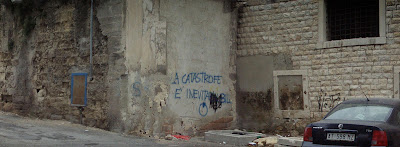


1.
entering Barletta Trani coming from, having left behind the castle and have passed the Porta Marina, take Via del Carmine Walls. Here we run into these walls and in this writing.
2.
(Semiotics as intended Hjelmslev is essentially a theory of form. It is language that gives shape and meaning to the world. Without the language the world would be unknowable formless matter is indeed unthinkable.
The apocalypse, that 's inability to account for the world, is a disintegration of reality, the loss of the world it operational.
If, as alleged, was the author of the preface to his Gospel that John the words "in the beginning was the Word, "is a parable of its coherent whole.
The apocalypse, that 's inability to account for the world, is a disintegration of reality, the loss of the world it operational.
If, as alleged, was the author of the preface to his Gospel that John the words "in the beginning was the Word, "is a parable of its coherent whole.
The lie in the ancient world was a mortal sin because it was seen come un contributo all’instabilità del mondo: l’Apocalisse è il regno della menzogna.)
3.
Dolce è la parola "catastrofe" nel suo originale significato: indicava infatti quel che accadeva alla fine delle tragedie greche, quando tutto andava a compimento e il fato, di cui le macchinazioni di uomini e dei cercavano di mutare la via, riprendeva inevitabilmente il suo corso.
Dolce, dicevo, perchè il senso delle cose veniva infine riconquistato e gli uomini nel considerare gli eventi a cui avevano assistito, non potevano non riconciliarsi con il mondo.
La prima volta that the word "catastrophe" was used in the modern sense and at the Lisbon earthquake as Voltaire, Rousseau and Kant will exchange views on divine justice and rationality in the world.
The term is now abused and "catastrophe" today we mean a sudden event that can upset this balance and create an epochal break, irretrievable divide between what was there before and what follows.
SJ Gould developed the theory of "punctuated equilibrium". The history of life is this: long, long periods where everything is discounted and mechanisms in chasing stories already seen regular violence and fantasy production, and then, suddenly, comes the catastrophe. Rarely per eventi "esterni", "naturali", "oggettivi", più spesso per logica e inevitabile conclusione della strada imboccata dalla vita.
Dal punto di vista di un virus o di un batterio la morte dell'ospite infettato, potrà sembrare strano, costituisce una catastrofe: milioni, miliardi di suoi simili muoiono con il corpo di chi li ospita. Se si espandesse troppo in fretta il patogeno provocherebbe la propria fine come specie.
Eppure che cosa ha fatto se non seguire il proprio naturale egoismo vitale? Ma dovrà mutare per evitare altre catastrofi: la sifilide in meno di cent'anni ha imparato a risparmiare gli uomini.
La catastrofe non è cosa "prepolitica". È, anzi, l'orizzonte nel quale oggi si manifesta il our actions - inevitably - political.
is not something to aspire to, is not the savior that appeal to our inability to change the state of things.
is something to avoid. Like the plague, in fact.
Dolce, dicevo, perchè il senso delle cose veniva infine riconquistato e gli uomini nel considerare gli eventi a cui avevano assistito, non potevano non riconciliarsi con il mondo.
La prima volta that the word "catastrophe" was used in the modern sense and at the Lisbon earthquake as Voltaire, Rousseau and Kant will exchange views on divine justice and rationality in the world.
The term is now abused and "catastrophe" today we mean a sudden event that can upset this balance and create an epochal break, irretrievable divide between what was there before and what follows.
SJ Gould developed the theory of "punctuated equilibrium". The history of life is this: long, long periods where everything is discounted and mechanisms in chasing stories already seen regular violence and fantasy production, and then, suddenly, comes the catastrophe. Rarely per eventi "esterni", "naturali", "oggettivi", più spesso per logica e inevitabile conclusione della strada imboccata dalla vita.
Dal punto di vista di un virus o di un batterio la morte dell'ospite infettato, potrà sembrare strano, costituisce una catastrofe: milioni, miliardi di suoi simili muoiono con il corpo di chi li ospita. Se si espandesse troppo in fretta il patogeno provocherebbe la propria fine come specie.
Eppure che cosa ha fatto se non seguire il proprio naturale egoismo vitale? Ma dovrà mutare per evitare altre catastrofi: la sifilide in meno di cent'anni ha imparato a risparmiare gli uomini.
La catastrofe non è cosa "prepolitica". È, anzi, l'orizzonte nel quale oggi si manifesta il our actions - inevitably - political.
is not something to aspire to, is not the savior that appeal to our inability to change the state of things.
is something to avoid. Like the plague, in fact.